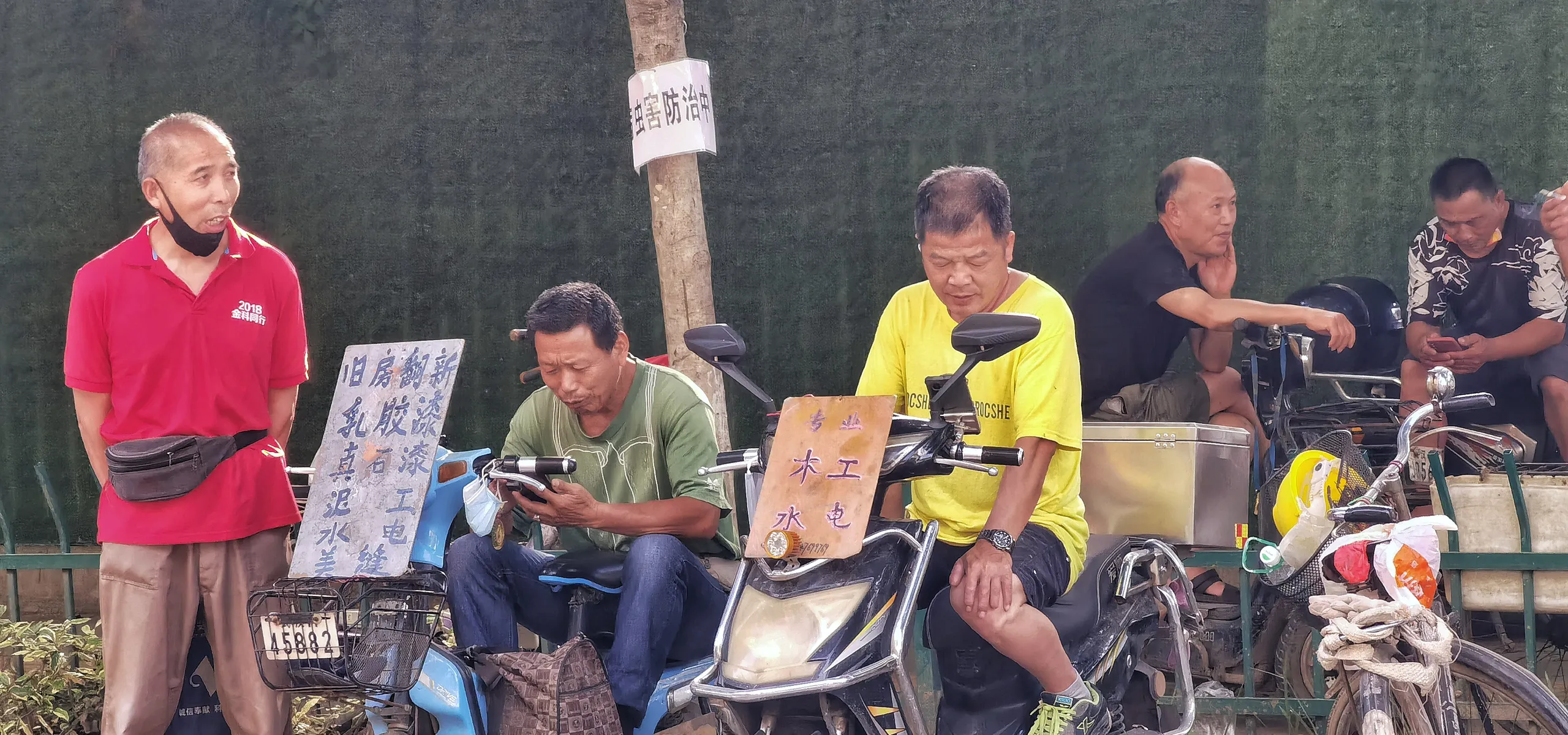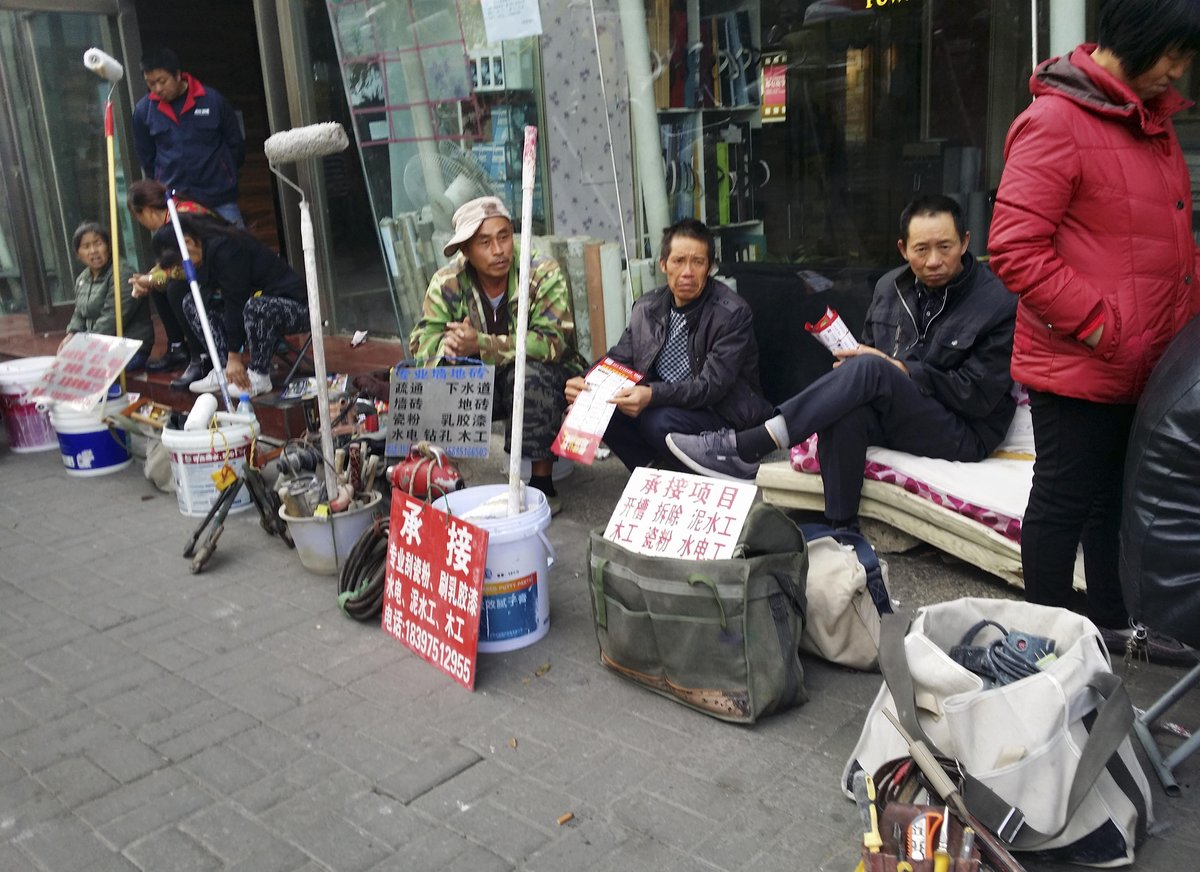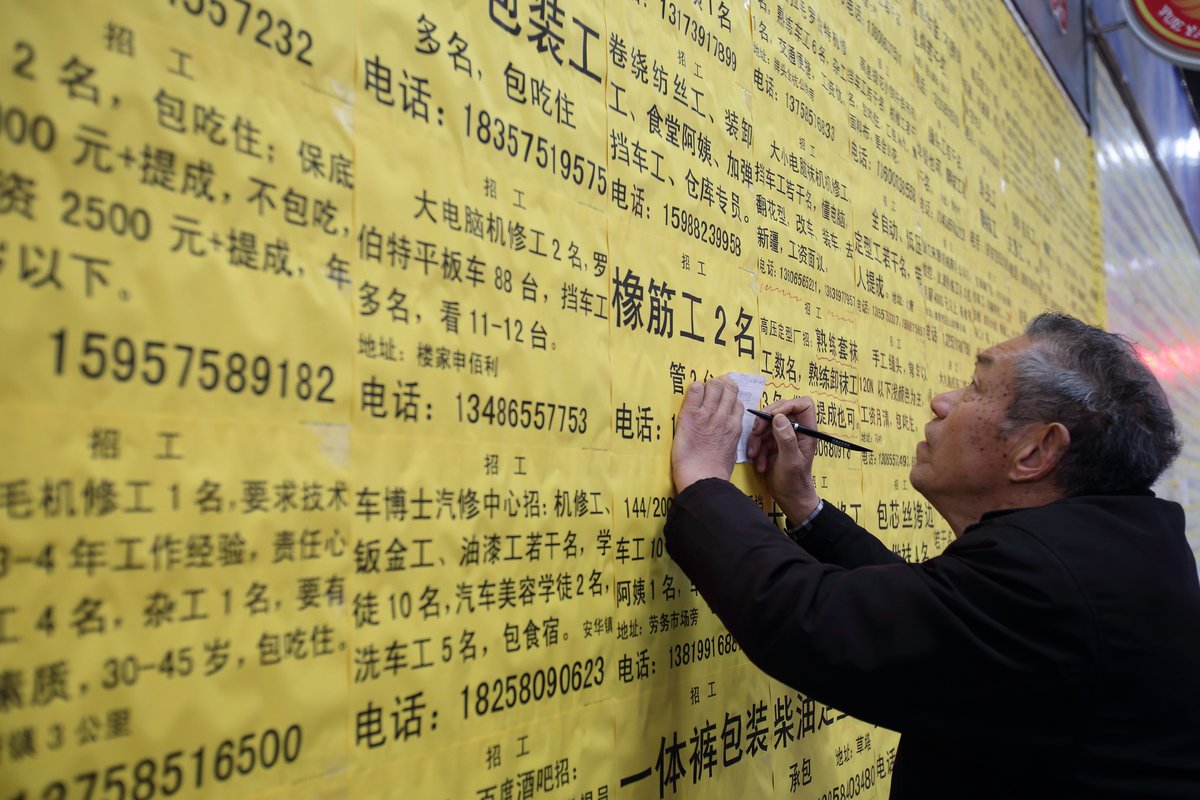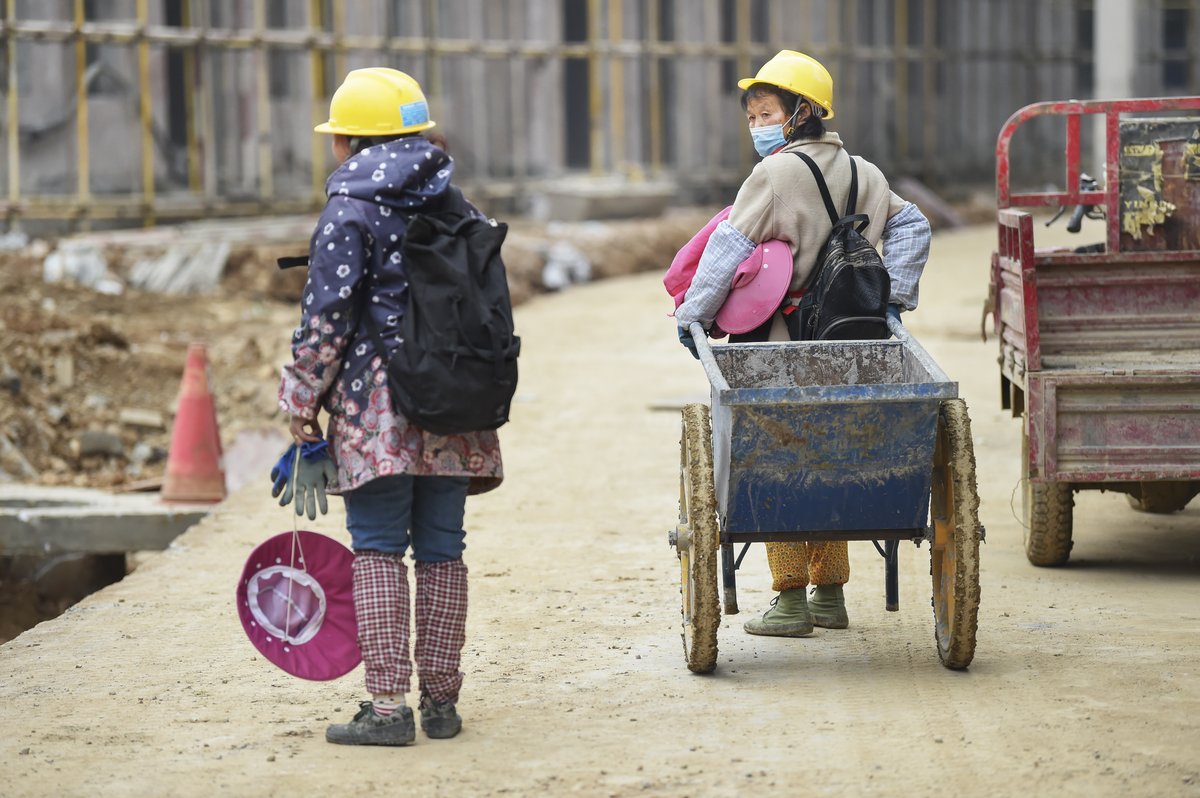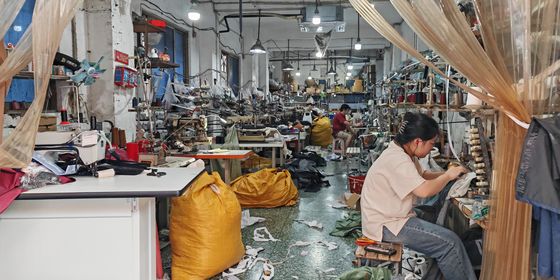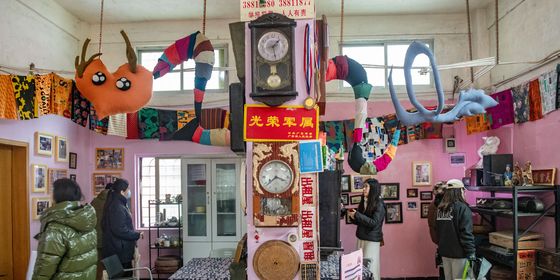With a growing urban-rural gap and lack of social security, China’s first-generation migrant workers are heading back to the workplace
To fool recruiters at Beijing’s Liuliqiao day labor market, 60-year-old Zhao Hua has dyed her gray hair black. On a Tuesday morning in March, Zhao has arrived, as she has every day in the last month, hoping to get a temporary gig on a construction site, event crew, or any other odd job opportunity despite being well past legal retirement age.
When TWOC meets Zhao shortly after 1 p.m., though, she has just been denied an elevator operator job by a recruiter who was diligent enough to check her age, despite the hair dye. “They told me they didn’t want anyone over 50, let alone 60,” she complains. She has been forced to try her luck at Liuliqiao because the regular jobs she used to hold, such as cleaning, also won’t hire seniors like her. “It’s not like I’m not competent enough to do the [elevator] job. I can climb stairs [like they asked for], but they just don’t want anyone over 55.”
“I’ve still got it in me, so why won’t they give me anything?” she asks.
Zhao, who agreed to be interviewed by TWOC under a pseudonym, is part of China’s first generation of migrant workers. In the 1980s, they left their rural hometowns to work on assembly lines, construction sites, and behind the service counters of China’s more economically developed coastal cities after the reforms. They have now reached retirement age: 60 for men, 55 for white-collar women, and 50 for blue-collar women like Zhao.
Yet many are still in limbo, left outside the urban pension system and still burdened by expenses like medical bills or their children’s education, marriage, or housing costs. Rather than enjoying their twilight years at home, some are finding themselves back on the labor market and forced to take temporary jobs, often uncontracted and uninsured, in the short-term labor market, with few prospects of stopping—until death.
Zhao was in her 20s when she first left her hometown of Fuyang in central China’s Anhui province to find work in the nation’s capital, first working as a nanny before changing to menial tasks that offered more flexible hours, like carrying bricks at construction sites, plastering walls, and unloading goods.
At the start of the pandemic, Zhao returned to Fuyang due to a lack of work opportunities in the city, but has returned to Beijing at age 60 in order to find temporary work and reduce the financial burden on her 33-year-old son, who is farming at home and raising his five school-aged children. But so far, she has only earned 200 yuan from one day of plastering for the entire month of March, and was rejected for every other job due to her age.
When TWOC finds Zhao, she is sitting among a dozen men in their 50s or older, who are sitting on cloth sacks packed with their belongings and holding cardboard signs advertising their services on a street near Liuliqiao in Beijing’s Fengtai district. This ad hoc labor market outside the Third Ring Road has become a junction for migrants living on a budget in Beijing’s outskirts, who may need to get up at 5 a.m. and spend two hours traveling to this street corner, where they spend the day waiting for recruiters offering temporary jobs such as loading parcels and laying cement.
More often, though, they end up waiting for up to 10 hours and getting no work, chatting and playing cards to kill time before going home and trying again the next day.
China’s urban-rural divide growing with age
Though hailing from different provinces like Shandong, Henan, and Shanxi, these day laborers share many similarities: aged 50 or above, with little education and few trained skills. Many are not tech-savvy enough to sign up for gig-based work via mobile apps, or even own a smartphone, but they are still the primary breadwinner in their family. Most of these elders are entitled to the rural pension in their hometowns, but this may be as meager as 100 yuan per month, which Zhao describes as “meaningless.”
When TWOC threw out the idea of retiring to their hometowns, the migrant group burst into a small debate. “When I’m 60 years old, I’ll go back home and open a small renovation company, or just go farming instead of wasting time here,” a man in his 50s declares. Others quickly shoot down this idea. “How could we support a whole family through one mu of land?” an elderly man in his 60s demands.
Without legal contracts, health insurance, and social security contributions from their employers, these elderly day laborers are victims of a giant rural-urban divide in retirement. According to a report by Peking University this March, around 18 percent of Chinese seniors aged between 65 and 70 are still working. Broken down by geographic location, however, only 4 percent of urban seniors are still working, while the rural working elderly population is as high as 27 percent.
China’s growing shortage of blue-collar workers has been well-reported since 2012, often attributed to young people being unwilling to take on the physically demanding jobs in construction sites and factories. Accordingly, the average age of China’s 292 million migrant workers in China has been growing—41, according to reports from the National Bureau of Statistics in 2021. Over 27 percent of migrants are above 50, but millions of unskilled older migrants are confined to low-paid basic positions like janitors, security guards, nannies, and public sanitation workers, earning an average of about 2,000 yuan per month.
In 2019, cities such as Shanghai and Shenzhen ordered construction sites to stop hiring elderly workers due to safety concerns. This drew immense criticism due to the potential job losses among a needy population. “I don’t know why [they won’t hire us in construction sites]. I can do whatever young people can do,” says Zhao, who has been turned down countless times this year due to her age. “I even told [the boss] they don’t have to pay me if I can’t do the job.”
Elderly workers over the retirement age are not eligible for work-related injury insurance, so companies are unable to insure them. On the other hand, the risk of injuries or even death on the job increases with the worker’s age. A report last March by news website The Paper noted that while only 1 percent of Shanghai’s migrant workers are over the age of 60, they accounted for 15 percent of deaths caused by construction accidents in 2018. This February, a 60-year-old courier died suddenly of a heart attack while sorting parcels, but the local social security bureau determined that since the man was beyond the legal working age, and did not have insurance, his family could not receive compensation for a workplace injury.
He Chuan, a 53-year-old mason, feels the ban on workers over 60 is reasonable. “When people get to that age, they get tired more easily and have slower responses on construction sites, where there are lots of danger zones.” He plans on taking more flexible work in his 60s, like being a security guard or cleaner in his neighborhood, or even returning to farm in his hometown in southwestern China’s Sichuan province, as long as he can make enough money to meet his basic needs.
He and his wife started working as construction workers in Fuzhou in China’s coastal Fujian province in 2003, and are still working in order to help their older son pay back the more than 600,000 yuan he owes in housing loans and to raise their younger son, who is in secondary school. “Young people now have lots of pressure, so as long as we can work, we will carry on until the day we can’t anymore,” says He. Instead of working physically demanding jobs, though, He’s son He Songlin hopes his father will work on developing his account on video platform Bilibili, where He documents his daily life, mixing concrete and having lunch before his 1 million followers.
Employers are also unable to pay into the pension fund and other state social insurance schemes for their day laborers, as these payments are allocated on a monthly basis. At this year’s meeting of the National People’s Congress, China’s highest lawmaking body, delegate Chen Xueping suggested making social insurance payable by the day to allow migrant workers without stable employment to retire.
Not everyone is as lucky as He, since many urbanized migrants have lost rights to their land in the village due to not having farmed it for over two years. Now, they have nothing to fall back on. In Liuliqiao, TWOC meets an old man from Henan province, who is sitting on the curb advertising his services as a carpenter. He was unwilling to reveal his name or age, but looked to be in his 70s, and tells TWOC he came to Beijing in his teenage years to work and has no farmland in his hometown. “I‘ll need to work as long as I live,” he says.
An uncertain future for elderly workers
“[Retirement-age migrant workers] continue to work in their 70s as they have no other form of security,” says Wang Dezhi, one of the founders of the Beijing Workmate Family, an NGO dedicated to protecting the interests and rights of the migrant worker community. “They cannot afford to get seriously ill and…they have no other source of income. Their children might not make much money either, and some are even helping their children pay off mortgages.”
The NGO, which runs a migrant worker museum and cultural events for workers on the outskirts of Beijing, once held an exhibition in 2015 showing how seven migrants who had worked in Shenzhen as electric welders, sanitation workers, and mechanics in the 1990s were unable to get pensions from the companies they’d worked for for decades. “In the early ’90s when our national social security system was not sound, lots of migrant workers retired without a pension. Therefore, those who got injured at work couldn’t work anymore when they were old and had nothing to rely on in their retirement,” says Wang.
“As an NGO, we can’t solve this issue. We can only provide limited services using the resources we have,” he says, such as offering free training classes in computer repair and graphic design, recommending jobs to migrant workers, and establishing a school for their children.
Last year, Zhao earned about 30,000 yuan from odd work like loading beer, moving bricks, and laying cement, and still hopes to find a steady job so she can put money aside for the future. “The older you get, the more you have to rely on yourself,” she says.
The old man who refused to give his name agrees, still optimistic that he can find a way to support himself. “There’s no road I can’t walk, no matter how long it is and how many people are in front of me,” he declares. “If the road stretches 2 li, I can do it. If it is 100 li, then I’ll walk it slowly as long as I’m alive.”
The Aging Migrant Workers Who Can’t Afford to Retire is a story from our issue, “After the Factory.” To read the entire issue, become a subscriber and receive the full magazine.





